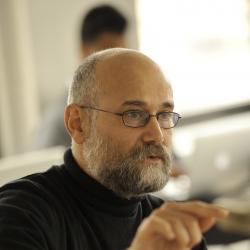That post headline is definitely a mouthful that boggle the brain. To put it all another way, it's all information-warfare overload to influence our ideals creating chaos and confusion - what's true and what's not is now an open question caused by the spread of viral dis-information defined as generating falsehoods aimed at creating a political goal . . . in a well-sourced and lengthy opinion piece by Emily Hazelton referenced farther down, the intended outcome and goal is simply to cause us to give up, exhausted, skeptical and cynical of politics
At the same time the spewing of the falsehoods, the conspiracy theories, the lies, the distortions and all the information encoded with anger is not meant to win any battle of ideas: ITS GOAL IS TO PREVENT THE ACTUAL BATTLE BEING FOUGHT BY CAUSING US TO SIMPLY GIVE UP. There are hard decisions to be made to overcome the chaos
SEE > https://www.nytimes.com/2020/10/13/magazine/free-speech.html
It's long, but here's an option
Listen to This Article
Audio Recording by Audm
Re: Sinclair Broadcasting
In early 2018, dozens of Sinclair newscasters across the country echoed Trump’s diatribes against the press by reading from the same script warning of “fake stories” from “some members” of the media. (Deadspin captured the repetition of the script in an eerie video montage.) In July, Sinclair released online an interview with Judy Mikovits, a conspiracy theorist who has accused Dr. Anthony Fauci of manufacturing the coronavirus. When the segment drew criticism, the company canceled the planned on-air broadcast but called itself “a supporter of free speech and a marketplace of ideas and viewpoints, even if incredibly controversial.”
Here's a clip to introduce just one person:
"In a 2018 book, “Network Propaganda,” Yochai Benkler, a director of the Berkman Klein Center at Harvard, and two researchers there, Robert Faris and Hal Roberts, mapped the spread of political disinformation in the United States from 2015 to 2018. Analyzing the hyperlinks of four million news articles, the three authors found that the conservative media did not counter lies and distortions, but rather recycled them from one outlet to the next, on TV and radio and through like-minded websites.
The dearth of competition for factual accuracy among conservative outlets leaves their audiences vulnerable to disinformation even if the mainstream news media combats it. . ."
____________________________________________________________________________
MEET > https://cyber.harvard.edu/people/ybenkler
Yochai Benkler
Jack N. and Lillian R. Berkman Professor of Entrepreneurial Studies, Harvard Law School; Director, Berkman Klein Center for Internet & Society

Yochai Benkler is the Berkman Professor of Entrepreneurial Legal Studies at Harvard Law School and the Berkman Klein Center for Internet and Society at Harvard University
Since the 1990s he has played a role in characterizing the role of information commons and decentralized collaboration to innovation, information production, and freedom in the networked economy and society. His books include Network Propaganda: Manipulation, Disinformation, and Radicalization in American Politics (Oxford University Press 2018) and The Wealth of Networks: How social production transforms markets and freedom (Yale University Press 2006), which won academic awards from the American Political Science Association, the American Sociological Association, and the McGannon award for social and ethical relevance in communications. In 2012 he received a lifetime achievement award from Oxford University “in recognition of his extraordinary contribution to the study and public understanding of the Internet and information goods.”



No comments:
Post a Comment